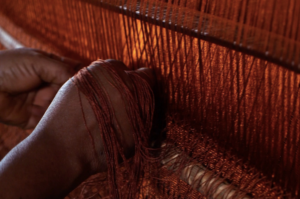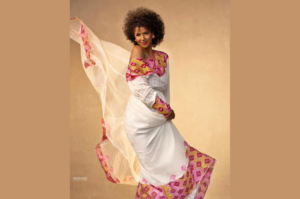
Celebrities all over the world are opening up on social media about their devastating pregnancy losses. This taboo topic has ignited important conversations surrounding the silence and stigma associated with miscarriages. It has also triggered crucial conversations in Nigeria about whether or not to share pregnancy news online.
I was at the office when I received an email that my pregnancy test results were positive. At 37, after 8 years of TTC, it took me a while to absorb the information. My body was still a fertile land. Having lived in Europe for more than 8 years, I didn’t believe in superstitions anymore; however, I kept the news away from my colleagues until I was placed on leave when I became too sick to function.
In my first trimester, I shared the news with my siblings and a few close friends who had been praying with me over the years for the fruit of the womb. My neighbours found out when they saw me with my tell-tale bump. I didn’t post any pictures on social media because womb watchers would notice my tell-tale glow.
In my fourth month when I resumed work, I didn’t use safety pins on my underwear or clothes before leaving home to ward off evil spirits as I have seen expectant women do back in Lagos. I answered questions about my due date. I touched and cradled my bump unconsciously in public but refused people from touching it. This wasn’t because I feared they will harm my baby but because during my pregnancy, I didn’t like being touched by anyone, not even my husband. I don’t know why. It just upset me a lot.
In Nigeria, women don’t share pregnancy news on social media before the baby is born. They keep it a secret for as long as possible. Extended family, neighbours and co-workers find out when the bump starts to show. Mothers-to-be guard their bump fiercely from people who might try to rub it. They don’t reveal their baby’s name before the child-naming ceremony. They announce the new arrival on social media two or three months after giving birth by sharing professional during-and-after pregnancy pictures.
In France, it is tradition to wait until the end of the first trimester to share the news. This stems from the fact that statistics show that the risk of miscarriage drops to 5% after week 12. Expectant women don’t want to have to announce the sad news of a miscarriage after sharing the exciting news of their pregnancy. Past the safe zone, French women share the news with their family and friends and also start shopping for baby stuff. Some women share ultrasound photos and baby registries on social media.
Many Nigerian celebrities and influencers will not share news of their pregnancy or even their due dates, something their American counterparts do. They wear loose clothes to hide a baby bump and may announce it when it is no longer easy to hide. Sometimes they post throwback pictures so that fans do not notice their sudden disappearance from social media. Then one day, out of the blue, they’ll share during-and-after pregnancy pictures.
American celebrities and influencers seem to compete to be the wittiest when they announce their pregnancy. They often share an ultrasound picture along with their estimated date of delivery (EDD). Throughout their pregnancy, they post bump photos, and baby shower videos and photos. They also reveal information such as their baby’s name and the sex before the bundle of joy even arrives.
Often in Nigeria, expectant women hide the good news because of the many superstitions surrounding pregnancy. Certain cultures believe that miscarriages can be caused by bad energy from jealous or wicked people who can jinx the pregnancy and steal the baby from the womb. Some cultures believe that a wandering spirit looking for a new body may drive the baby out to reincarnate. An example of this is the abiku in Yoruba cosmology. Some believe that unclean spirits looking for an abode may enter into the baby and dwell there.
People continue to believe in these superstitions because the rate of miscarriage and stillbirth is still very high in Nigeria. Most times, it occurs naturally without any human intervention or due to medical error. In rare cases, pregnancy can be terminated due to fetal abnormality that is not compatible with survival. Although most miscarriages occur in the first trimester, loss in the second and third trimesters are not uncommon. A stillbirth may occur due to late or no prenatal care, fetal anomalies, delay in reaching a medical facility or accessing obstetric care during an emergency, preterm and c-section complications, and lack of skilled care during-and-after birth.
The decision to not announce my pregnancy on social media was not based on superstition. I didn’t worry about reaching my EDD but I was afraid of labor and delivery (even though France has high-quality healthcare). The fear took root after I was told my pregnancy was high risk because of my age, myomectomy scars, and uterine fibroids.
I found out my daughter was not healthy during my second-trimester anatomy scan. Six weeks later, I had to undergo a procedure called feticide. An injection was used to stop the fetal heartbeat. The underlying cause of the condition remains unknown. The doctors have said that it was not caused by the drugs I was prescribed to relieve some of the uncomfortable pregnancy symptoms I suffered.
A friend tried to convince me that the loss of my daughter, Deborah, is spiritual. She thinks I shouldn’t have told anyone before “my miracle manifested”. I do not agree with her. I truly believe that there is no right or wrong time to share the news. Every woman should do what she is comfortable with. I, however, agree with Reno Omokiri, a Nigerian human rights activist, who once tweeted, “Even if you keep pregnancy private, tragedy may still happen. But it is easier to deal with private tragedy than with a very public one.”
Photo by Prateek Katyal from Pexels










COMMENTS -
Reader Interactions